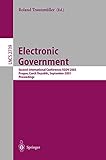Electronic Government [electronic resource] : Second International Conference, EGOV 2003, Prague, Czech Republic, September 1-5, 2003. Proceedings / edited by Roland Traunmüller.
Material type: TextSeries: Lecture Notes in Computer Science ; 2739Publisher: Berlin, Heidelberg : Springer Berlin Heidelberg, 2003Description: XVIII, 518 p. online resourceContent type: text Media type: computer Carrier type: online resourceISBN: 9783540452393Subject(s): Computer science | Computer Communication Networks | Information systems | Education | Computers -- Law and legislation | Information Systems | Computer Science | Computers and Society | Computer Communication Networks | Information Systems Applications (incl.Internet) | Computers and Education | Legal Aspects of Computing | Management of Computing and Information SystemsAdditional physical formats: Printed edition:: No titleDDC classification: 004 LOC classification: QA76.9.C66Online resources: Click here to access online
TextSeries: Lecture Notes in Computer Science ; 2739Publisher: Berlin, Heidelberg : Springer Berlin Heidelberg, 2003Description: XVIII, 518 p. online resourceContent type: text Media type: computer Carrier type: online resourceISBN: 9783540452393Subject(s): Computer science | Computer Communication Networks | Information systems | Education | Computers -- Law and legislation | Information Systems | Computer Science | Computers and Society | Computer Communication Networks | Information Systems Applications (incl.Internet) | Computers and Education | Legal Aspects of Computing | Management of Computing and Information SystemsAdditional physical formats: Printed edition:: No titleDDC classification: 004 LOC classification: QA76.9.C66Online resources: Click here to access online  E-BOOKS
E-BOOKS
| Current library | Home library | Call number | Materials specified | URL | Status | Date due | Barcode |
|---|---|---|---|---|---|---|---|
| IMSc Library | IMSc Library | Link to resource | Available | EBK5271 |
e-Governance -- e-Democracy -- Change Management -- Electronic Service Delivery -- Web Services -- Models and Methodology of e-Government Research -- Trust and Security -- Knowledge Management -- Geographical Information System (GIS) -- Technical Systems -- Legal Aspects -- Workshop: Global Relations and Regional Development.
The EGOV Conference Series intends to assess the state of the art in e-Gove- ment and to provide guidance for research and development in this fast-moving ?eld. The annual conferences bring together leading research experts and p- fessionals from all over the globe. Thus, EGOV 2003 in Prague built on the achievements of the 1st EGOV Conference (Aix-en-Provence, 2002), which p- vided an illustrative overview of e-Government activities. This year the interest even increased: nearly 100 contributions, and authors coming from 34 countries. In this way EGOV Conference 2003 was a reunion for professionals from all over the globe. EGOV 2003 brought some changes in the outline and structure of the c- ference. In line with the broadening of the ?eld and a growing number of s- missions it became necessary to decentralize the reviewing process. So reviewing was done via stream chairs who deserve high praise for their dedicated work. In addition, a workshop part was included to cover some subjects of emerging signi?cance, such as dissemination, networking, and regional developments. F- ther, a subtitle of the conference was chosen that would mirror the expansion of e-Government to e-Governance. Consequently, in this year’s conference gov- nance, democratic deliberation and legal issues occupied a growing share. Last, but not least, GIS was incorporated as a topic due to the increasing importance of geographical information systems for planning and operations.


There are no comments on this title.